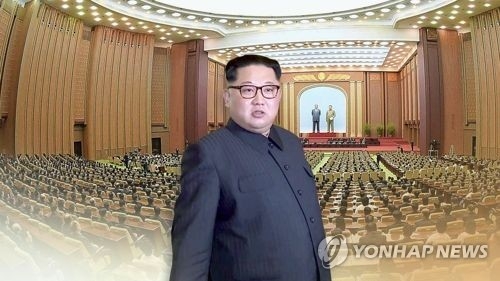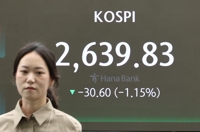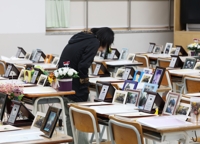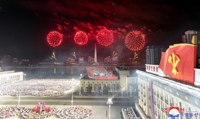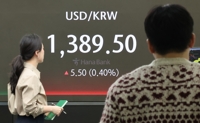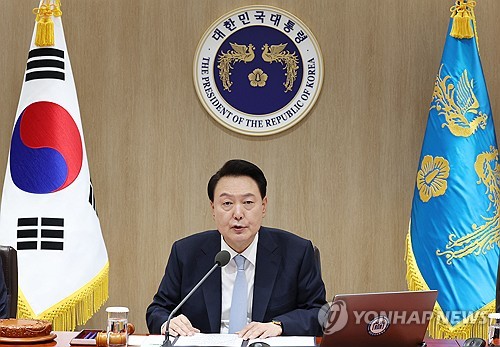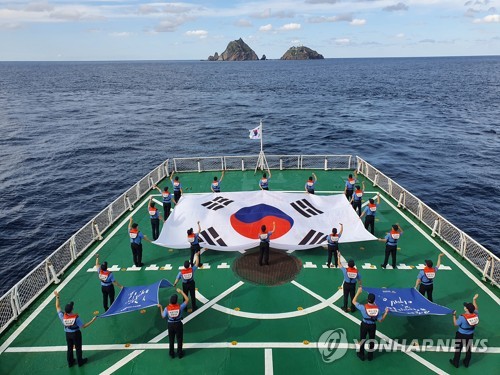(LEAD) (News Focus) North Korean leader shifts policy focus to economy
(ATTN: ADDS more details in last 3 paras)
By Song Sang-ho
SEOUL, April 21 (Yonhap) -- North Korean leader Kim Jong-un appears to be shifting his policy focus to lifting the North's threadbare economy, amid brisk diplomacy that could lead to sanctions relief and security assurances, experts here said Saturday.
During Friday's plenary central committee meeting of the North's ruling Worker's Party, Kim vowed to focus on boosting the economy, while suspending nuclear and missile tests and closing a key atomic experiment facility, according to the North's Korean Central News Agency.
The measures could mark Kim's strategic course correction after incremental global sanctions have crippled his country's economy, eroded public support and loyalty from the elites, and fueled diplomatic friction with China, its key economic patron.
The announcement came ahead of Kim's summits with South Korean President Moon Jae-in on April 27 and United States President Donald Trump in May or early June.
"Should the issue of a security guarantee be discussed in the planned summit with the United States, the issue left for Kim is economic construction, based on which he may want to deliver on his avowed goal of making the North an 'economically strong' country by 2020," Cho Bong-hyun, a senior researcher at the Industrial Bank of Korea, told Yonhap News Agency.
"Kim appears to have determined that economic achievement could help him stably keep his regime and burnish his image overseas," he added.
The North's economy has continued to deteriorate, as the country has gone into overdrive with its nuclear and missile programs that have triggered tough U.N. Security Council (UNSC) sanctions as well as standalone ones by the U.S., South Korea, Japan and other countries.
Particularly, Beijing's active enforcement of the UNSC sanctions has dealt a critical blow to the North's economy, given that the world's second largest economy accounts for some 90 percent of Pyongyang's aggregate trade.
Sanctions that have dried up Kim's cash coffers also threatened to hurt his dynastic family's long-standing tactic of statecraft -- compelling the elites' loyalty with a slew of gifts unthinkable for ordinary citizens, such as luxury watches and cars, North Korea watchers said.
"Due to the sanctions, hard currency might have started to hit the bottom and this situation might have affected the loyalty among those (elites) in Pyongyang," Park Won-gon, security expert at Handong Global University, said.
"Kim might have to scrape the bottom of the barrel to secure governing funds, and this might have added to his sort of threat perception," he added.
Sanctions have reportedly led to sharp cuts in trade, revenues from allegedly illicit overseas business dealings, as well as erstwhile steady remittances from the North's overseas workers who have been banned from extending their time abroad.
Due to the intricate web of global sanctions, Kim's past economic reform projects have languished, experts noted.
In June 2012, Kim took a reform initiative that reportedly gave greater autonomy to state corporations, allowing them to choose their production items, prices, amounts and marketing methods. It was also said to allow farmers to keep their surplus harvests.
In May 2013, he designated a number of special economic development zones, seeking to attract foreign investment from China, Russia and other countries. In May of the following year, he took additional measures to loosen state control over factories and shops.
But all these measures have not yielded tangible progress due in large part to the crippling sanctions that have been adopted in response to a slew of the North's nuclear and long-range missile tests, including the sixth and most powerful atomic test in September last year.
"Yes, Kim did make reform attempts, but they were all talk and little action," Ahn Chan-il, head of the World Institute for North Korea Studies, told Yonhap.
"With a large portion of the North's state enterprises failing to function properly, many citizens rely on unofficial markets for a living. To put it simply, the North's state economic system has virtually been paralyzed. Kim seeks to revive it now," he added.
It remains unclear what development model Kim will adopt to lift his country out of the economic backwater, but Ahn noted that Kim could try to pursue a convergence of Chinese, Cuban and Vietnamese economic development models.
"Kim might seek a 'fusion' model that adopts good features of other socialist systems, which are favorable for him to maintain his political system ... one that can be applicable to the North's current economic reality," he said.
Kim's announcement on a policy shift came after he visited China for talks with Chinese leader Xi Jinping late last month -- his first known international trip since he took power in late 2011. At the time, he stopped by Beijing's Zhongguancun High-tech Zone for a glimpse into China's meteoric economic ascent -- a reason why some observers said he could consider China's economic model.
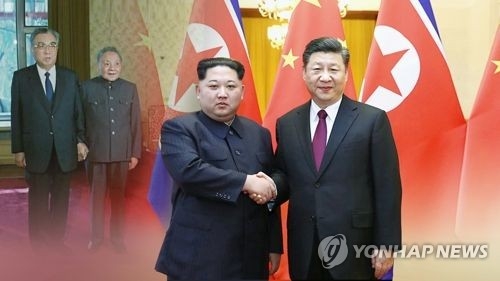
This image, provided by Yonhap News TV, shows North Korean leader Kim Jong-un (L) and Chinese leader Xi Jinping. (Yonhap)
With the reclusive leader cranking up his diplomacy, cautious optimism has grown that he may seek to position himself as a communist paragon of openness and reform -- akin to Deng Xiaoping, who spearheaded China's economic reforms in the late 1970s.
Based on the ideological grounds that China at the primary stage of socialism needed capitalist elements to boost its economy, Deng set his country on a path to economic development and laid the groundwork for "socialism with Chinese characteristics." This could be a takeaway for Kim, some analysts said.
"With the Communist Party of China front and center, the Asian power has achieved economic development in a short span of time while keeping its political system," Cho of the Industrial Bank of Korea said. "This could be one thing Kim might be studying."
But what matters now is an outside impetus to keep the North Korean leader on track towards openness and reform.
"Whether or not Chairman Kim can become North Korea's Deng Xiaoping hinges on how the international community, including South Korea and the U.S., will ensure the North's security and offer opportunities for its economic development," Cheong Seong-chang, a senior research fellow at the Sejong Institute, said.
Meanwhile, observers said that Friday's policy decision by the party's central committee underscores that the North under Kim's leadership seeks to become a "normal" socialist state in which the ruling party plays a pivotal policymaking role.
During the era of Kim Jong-il, the current leader's late father, Army generals held significant sway over policy due to his military-first policy, which was seen as part of a strategy to justify his mobilization of troops for non-military state affairs, mostly labor-intensive construction work.
Since the current leader took power in 2011, he has been seen putting the party back at the center of state affairs, in an apparent step to attenuate the influence of the rigid, conservative military brass and add more flexibility to his state management.
sshluck@yna.co.kr
(END)
-
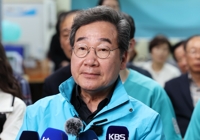 Ex-PM suffers crushing defeat
Ex-PM suffers crushing defeat -
 Defense chief says N. Korea's hypersonic missile 'unsuccessful' in last-stage glide flight
Defense chief says N. Korea's hypersonic missile 'unsuccessful' in last-stage glide flight -
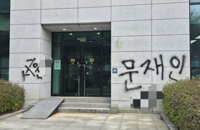 Man in his 40s nabbed for spray-painting slurs toward ex-President Moon
Man in his 40s nabbed for spray-painting slurs toward ex-President Moon -
 Police catch 1,681 over alleged election law violations
Police catch 1,681 over alleged election law violations -
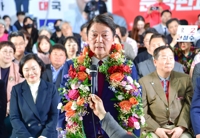 PPP lawmaker says entire Cabinet should resign over general elections defeat
PPP lawmaker says entire Cabinet should resign over general elections defeat
-
 Defense chief says N. Korea's hypersonic missile 'unsuccessful' in last-stage glide flight
Defense chief says N. Korea's hypersonic missile 'unsuccessful' in last-stage glide flight -
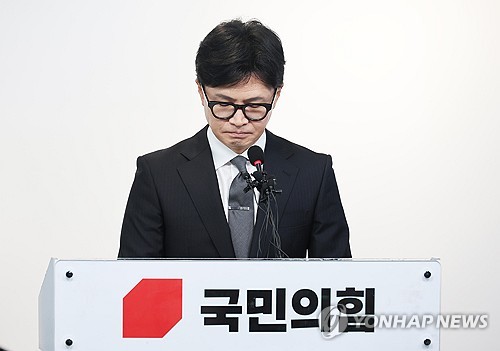 Ruling party leader resigns following election defeat
Ruling party leader resigns following election defeat -
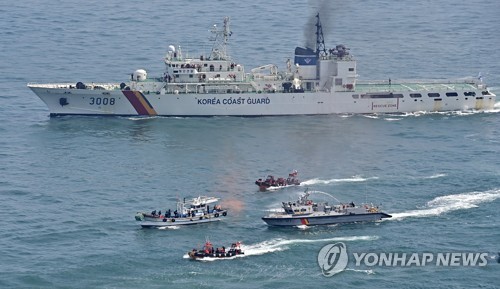 Yoon orders firm response to illegal fishing by Chinese vessels
Yoon orders firm response to illegal fishing by Chinese vessels -
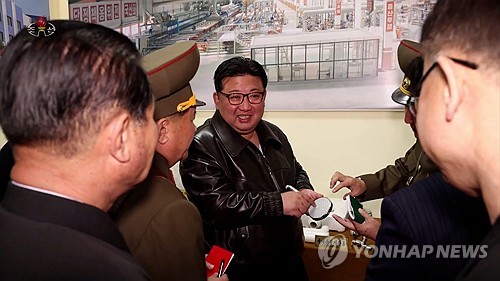 N.K. leader vows to deal 'death-blow' to enemy in event of confrontation: KCNA
N.K. leader vows to deal 'death-blow' to enemy in event of confrontation: KCNA -
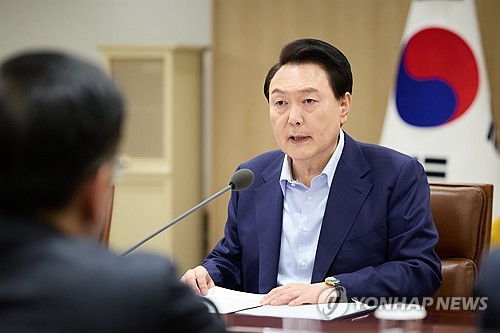 Yoon presides over emergency meeting on Mideast crisis
Yoon presides over emergency meeting on Mideast crisis
-
 N. Korea has capability to genetically engineer biological military products: U.S. report
N. Korea has capability to genetically engineer biological military products: U.S. report -
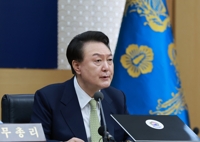 (LEAD) Yoon to address election defeat Tuesday
(LEAD) Yoon to address election defeat Tuesday -
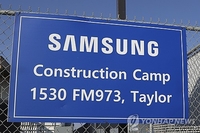 (3rd LD) U.S. unveils US$6.4 bln in CHIPS Act grants to Samsung Electronics
(3rd LD) U.S. unveils US$6.4 bln in CHIPS Act grants to Samsung Electronics -
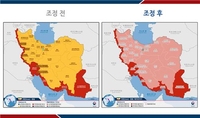 S. Korea issues special travel advisory for Iran amid escalating Mideast tensions
S. Korea issues special travel advisory for Iran amid escalating Mideast tensions -
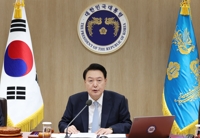 (LEAD) Yoon vows to improve communication with people after election defeat
(LEAD) Yoon vows to improve communication with people after election defeat
